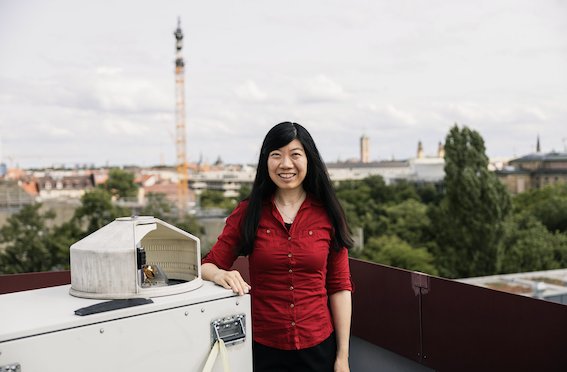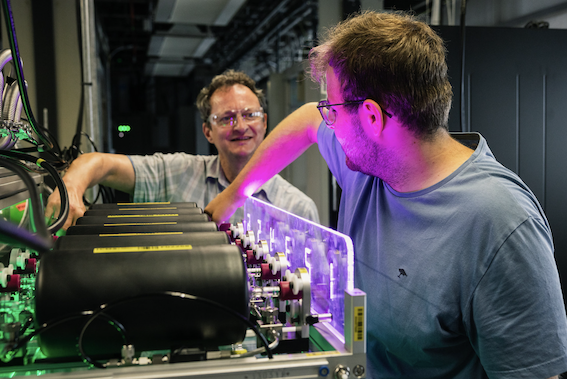
A cutting-edge greenhouse gas monitoring network, set up by the Technical University of Munich (TUM), gives Munich policymakers access to a nuanced picture of the city’s progress in reducing its greenhouse gas emissions. Munich residents also have more faith in local authorities than in national governments to act on climate change, new data from the European Social Survey reveals.
The monitoring network, spearheaded by TUM in cooperation with the Europe-wide ICOS Cities project, is now providing an unprecedentedly detailed and real-time understanding of the city's emissions. “The advantage of this new approach is that we can understand greenhouse gas emissions at a completely new scale, spanning from the city level to local sources such as traffic and power plant emissions,” says Jia Chen, Professor of Environmental Sensing and Modelling, and leader of the ICOS Cities team in Munich.

The team has deployed an extensive network of more than 100 scientific instruments covering the city of Munich. Prof Chen points out the benefits: “With this equipment, we can measure the greenhouse gas concentrations in the air before entering the city and after passing through the city.”
This comprehensive geographic coverage enables the precise identification of emissions originating from the city, a significant improvement over the previous reliance on city emission inventories that are compiled every two years. “For policymakers, this lag has meant that the efficacy of climate measures cannot be determined quickly,” Prof Chen underlines. With quicker access to data, the policymakers in Munich can swiftly evaluate the effectiveness of climate measures and refine their urban climate action plans with greater accuracy.
Munich's emission complexity unveiled
The TUM team has also revamped the city emission inventories - both temporally and spatially, Prof Chen explains: “Temporally means that our measurements show the trend of Munich’s CO2 emissions over the year. Spatially means that we can see where the emissions are coming from. Combining both, we can monitor and evaluate the emissions of a certain city area over the years and see whether the mitigation policies in that area generated tangible effects. The benefit is that the city can confirm, via actual measurements, if the mitigation policy is working and where more actions are potentially needed. This also helps improve the quality of future emission inventories.”
Exciting initial findings also suggest that the city's green spaces play a vital role in offsetting human-induced emissions during peak growth seasons in the summer, potentially balancing them completely when also considering the vegetation surrounding Munich. “This means that the city could extend green infrastructure to reach their climate goals,” Prof Chen points out.

Using advanced monitoring equipment, the team has also detected and mapped local methane emission hotspots and unaccounted emission sources, such as the Oktoberfest, a leakage in the local gas network, a sewage treatment plant, and an abandoned landfill. According to Prof Chen “this information will help the city target efforts to maximize climate action."
Prof Chen highlights the broader implications of the team’s work: "The knowledge gained in Munich will not only help the Bavarian capital but will support atmospheric observation networks to be rolled out in cities across the world.”
"The extensive collaboration between the cities in our project is one of the keys to success," adds Dr Werner Kutsch, ICOS Director General and coordinator of the ICOS Cities project. In the project, Munich, Zurich, and Paris are piloting urban greenhouse gas monitoring networks. "The scientists in the three pilot cities learn from each other to develop guidelines that are shared with other cities in Europe and beyond."

New survey: Munich residents trust local authorities over national government
Also part of the ICOS Cities project, a new study performed by the European Social Survey (ESS) collected data among Munich’s residents, shedding light on the attitudes and concerns of the inhabitants regarding climate change. “Munich residents are clearly aware of the causes and consequences of climate change, more so than the general German population In Munich. 76% of respondents believe climate change is human-caused and in Germany this percentage decreases to 49%,” says Agustin Blanco, ESS researcher.
Dr Diana Zavala-Rojas, ESS Deputy Director, adds: “The survey also shows a broad support among Munich residents for environmental public policies aimed to mitigate climate change.”
Moreover, 54% of Munich residents express that they are extremely or very worried about climate change, with the depletion of natural resources and the rising summer temperatures being their primary concerns. The survey also reveals a strong confidence in local governance, with Munich residents expressing greater trust in their city authorities to act on climate change compared to the national government.
"Respondents might believe that local governments are the most likely to take action on climate change since many environmental public policies are implemented at the city/municipality level. Respondents are also aware about how these policies affect their day-to-day lives and therefore hold more confidence in their municipalities when it comes to environmental action," says Dr Zavala-Rojas.